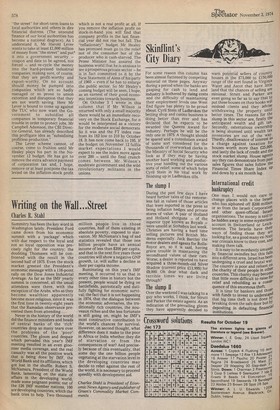Writing on the Wall...Street
Charles R. Stahl
Summitry has been the key word in Washington lately. President Ford came down from his economic summit with a 'package' which with due respect to the loyal and not so loyal opposition was precisely right for the country; the doubting Thomases will be confronted with the result in the second half of 1975. Even the stock market greeted the President's economic message with a 116-point rally on the Dow Jones Industrial Average. As far as the IMF yearly summit is concerned, all the usual attendees were there, with the exception of the Arabs, who as they become wealthier apparently become more religious, since it was the first time in twenty-eight years that the Ramadan observance prevented them from attending ...
Never in the history of the world did the finance ministers and heads of central banks of the 'rich' countries drop so many tears over the problems of the 'poor' countries. The gloom and despair which pervaded this year's IMF meeting resulted in an even gloomier media coverage, and the real casualty was all the positive work that is being done by IMF, the World Bank and its affiliates, which got lost in the shuffle. Robert S. McNamara, President of the World Bank, lamenting on the state of affairs in the developing world, made some poignant points; out of the 126 IMF member nations, 100 are developing countries, which the bank tries to help. Two thousand million people live in those countries, half of them existing in absolute poverty, exposed to starvation. Mr McNamara's bag of sad statistics revealed that those one billion people have an annual income of less than $200 per capita, and that in the next five years those countries will show a negative GNP growth, i.e. will suffer a decline in their per capita income.
Ruminating on this year's IMF meeting, it occurred to us that in every other time in history but the present, people would be dying on battlefields, patriotically and dutifully fighting for economic survival; the fact that it is not happening in 1974, that the dialogue between the economic adversaries, the traditionally rich countries, the nouveaux riches and the less fortunate is still going on, might be IMF's most constructive contribution to the world's chances for survival. However, on second thought, what difference does it make to the poor in Africa or India whether they die of starvation or from the consequences of war? And precisely because of this eventuality, that some day the one billion people vegetating at the starvation level in the developing countries may decide to rebel against the rest of the world, it is necessary to proceed speedily with development aid.
Charles Stahl is President of Economic News Agency and publisher of Green's Commodity Market Comments


































 Previous page
Previous page